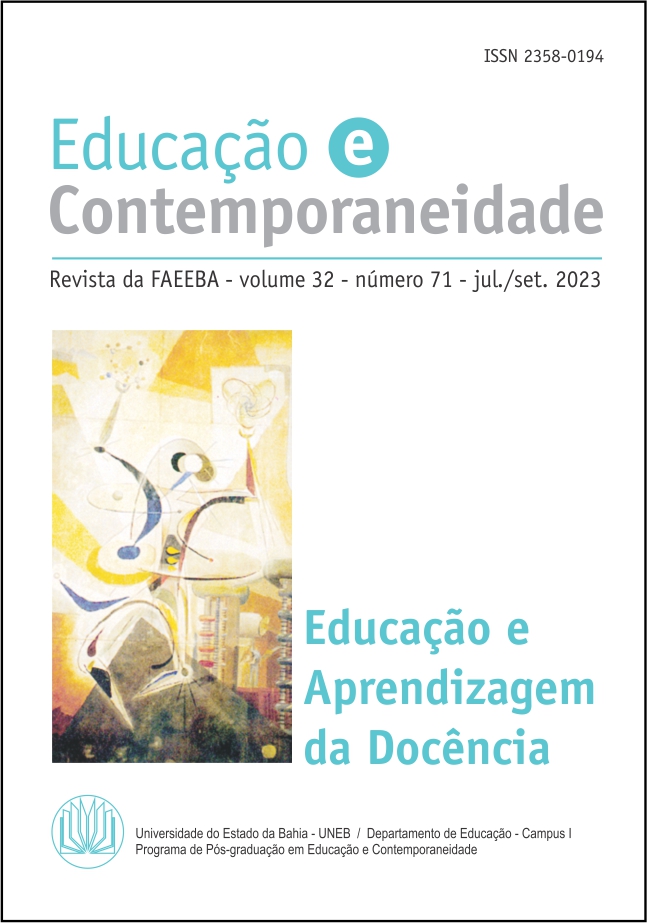Teaching as Academically Based Professional Practice
DOI:
https://doi.org/10.21879/faeeba2358-0194.2023.v32.n71.p21-38Palavras-chave:
: Teaching, Teacher Preparation, Professional PracticeResumo
This discussion presents an argument for developing teaching as a profession wherein practitioners have a shared academic knowledge base, practices, procedures, and protocols with an understanding of how and the conditions under which to apply specific approaches. In this conceptualization, teaching is viewed as an interpretive practice that relies on academic knowledge for practice generated through research on practice translated into procedures and protocols that have been tested and validated. Knowledge from practice is generated through systematic observation and documentation of students’ responses to learning experiences and the social context for learning. Teacher preparation includes the knowledge base for teaching and a separate knowledge base for learning to teach.
Downloads
Referências
Abadzi, H. (2008). Efficient learning for the poor: New insights into literacy acquisition for children. International Review of Education, 54(5/6), 581-604.
Bambrick-Santoyo, P. (2012). Perfecting practice. The Phi Delta Kappan, 94(1), 70-71.
Breger, L. (2017). Poverty and student achievement in Chicago public schools. The American Economist, 62(2), 206-216.
Chen, X. & Simone, S. (2016). Remedial coursetaking at U. S. public 2- and 4- year institutions: Scope, experiences, and outcomes. Washington, DC: U. S. Department of Education, National Center for Educational Statistics, Institute of Education Sciences.
Council of Chief State School Officers (2013). InTASC model core teaching standards and learning progressions for teachers 1.0. Washington, DC: Author. https://ccsso.org/resource-library/intasc- model-core-teaching-standards-and-learning-progressions-teachers-10
Danielson, C. (2013). Framework for teaching evaluation instrument. Danielson Group: https://danielsongroup.org/resources/framework-for-teaching-evaluation-instrument/
Hollins, E. R. (2012). Learning to teach in urban schools: The transition from preparation to practice. New York: Routledge.
Hollins, E. R. (2019). Teaching to transform urban schools and communities: Powerful pedagogy in practice. New York: Routledge.
Hollins, E. R. & Warner, C. K. (2021a). Rethinking teacher preparation program design. New York: Routledge.
Hollins, E. R. (2015). Culture in school learning: Revealing the deep meaning (3rd edition). New York: Routledge.
Hollins, E. R., & Warner, C. K. (2021b). Evaluating the clinical component of teacher preparation programs. National Academy of Education Committee on Evaluating and Improving Teacher Preparation Programs. National Academy of Education.
National Center for Educational Statistics (2019). The Nation’s Report Card: 2019 mathematics and reading assessment. Washington, DC: U. S. Department of Education, National Center for Educational Statistics, Institute of Education Sciences.
National Center for Educational Statistics (2019). The Nation’s Report Card: 2019 Trial Urban School Districts’ mathematics and reading assessment. Washington, DC: U. S. Department of Education, National Center for Educational Statistics, Institute of Education Sciences.
Palumbo, A. & Kramer-Vida, L. (2012). An academic curriculum will close the academic achievement gap. The clearing House, 85(3), 117-121.
Parsons, S. A., Dodman, S. L., Burrowbridge, S. C. (2013). Broadening the view of differentiated instruction. The Phi Delta Kappan, 95(1), 38- 42.
Payne, C. M. & Ortiz, C. M. (2017). Doing the impossible: The limits of schooling, the power of poverty. The Annals of the American Academy of Political and Social Science, 673, 32-59.
Payne, R. K. (2005). A framework for understanding poverty (4th edition). Hyland, Texas: aha! Process.
Roberts, S. L. (2014). Effectively using social studies textbooks in historical inquiry. Social Studies Research and Practice, 9(1), 119-128.
Rogoff, B. & Wertsch, J. V. (1984). Children’s learning in the “Zone of Proximal Development.” San Francisco: Jossey-Bass.
Samuels, S. J. (1997). The method of repeated readings. The Reading Teacher, 50(5), 376-381.
Williams, J. H. (2016). Grand Challenges for Social Work: Research, Practice, and Education.
Social Work Research, 40(2), 67-70. Social Work Research, Vol. 40, No. 2 (June 2016), pp. 67-70
Downloads
Publicado
Como Citar
Edição
Seção
Licença
Copyright (c) 2023 Etta Hollins

Este trabalho está licenciado sob uma licença Creative Commons Attribution-NonCommercial 4.0 International License.
O encaminhamento dos textos para a revista implica a autorização para a publicação.
A aceitação para a publicação implica na cessão de direitos de primeira publicação para a revista.
Os direitos autorais permanecem com os autores.
Após a primeira publicação, os autores têm autorização para a divulgação do trabalho por outros meios (ex.: repositório institucional ou capítulo de livro), desde que citada a fonte completa.
Os autores dos textos assumem que são autores de todo o conteúdo fornecido na submissão e que possuem autorização para uso de conteúdo protegido por direitos autorais reproduzido em sua submissão.
Atualizado em 15/07/2017



